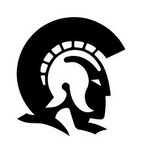Spartans were living in the Greek city of Sparta which was located at the banks of the river Eurotas at the peninsula southwest of Athens in Peloponnese. It was famous as the military city. It is believed to be founded by the offspring of Taygete and Zeus, called Lacedaemon who got married to the daughter of Eurotas named Sparta. Sparta didn’t create art, philosophy or literature but its citizens were famous for their braveness and because they kept the Greek values alive. The government system was formed by Lycurgus since the late 9th century BC and was mainly oligarchic. The main leaders were 2 kings, “descendants of Hercules” and also had power the Senate, the Elder’s Parliament, the Ecclesia (or Apella) and the 5 regents.
The Spartan Society
Sparta’s population was distributed in three groups: the Spartan citizens, the helots and the perioeci. Below is some information about them.
Spartans
Spartans were the people that enjoyed the rights of full citizenship. All males of the Spartan group had to join the military service and contribute in the education system sponsored by the state. Their focal point was on war and obedience. Loyalty to the state was everything for them, even family came after that.
Helots
Helots were the people who worked as slaves under the Spartans. They originated from Messenia and Laconia, which were later conquered by the Spartans and then these people were kept as slaves. The Helots were the backbone of the Spartan society as they used to handle routine tasks of the society. The Helots were treated badly by the Spartans, they used to torture them mentally and physically, so they always remain below them.
Perioeci
The people of the group Perioeci were dwellers, they were traders and craftsmen lived in nearby villages. They were neither slaves, nor they held any citizens’ rights. The weapons used by Spartans were also made by the Perioeci.
Spartan men and women, the institution of marriage
In Sparta, it was a principle of the society that since the child’s birth it belonged to the state. Whenever a child was born, the infant was inspected by the state to check whether it was healthy or not. If the child was weak, it was sent to the near cliff named Keadas and left there to die mercilessly. The healthy ones were then growing with their parents till the age of seven. When the boys reached to the age of seven, they were taken back from their parents and were kept under the strong supervision of Pedonomus along with other boys in groups of 64 children. They were not used to receive any literacy education, neither they were allowed to learn art and music. Instead of this they learnt the art of fighting, gymnastics and were extremely trained for military exercises. They got hard beds to sleep in dormitories and they used to get coarse food and black broth. They were taught to tolerate the hardships and pain and live with dignity and no complaints. They were expected to fulfill the orders without asking any questions. The Spartan boys were recognized as complete soldiers by the age of twenty.
In the ancient Sparta, women used to enjoy more rights and freedom as compared to other Greek societies. The women of Sparta, similar to their male counterparts were not used to receive any education related to art and music. However, they often get formal education in a sacred environment. They were not trained to do typical home chores such as cooking, or cleaning home, all these chores were performed by helots. The women did not get the military training but in order to attract their maters, the women underwent athletic activities, such as wrestling and javelin throwing. When they would reach adulthood, it was permissible for them to possess and administer property. In addition, they were not allowed to live with self-indulgence, their main work was to give birth to and grow healthy children to whom they used to give a shield and sent them to war with the famous phrase ‘’I tan I epi tas’’ which means ‘’or to come back with the shield as a winner or dead on your shield as a warrior’’.
The state of Sparta emphasized on marriage as they took it a way to grow their human strength. Before marriage, the woman’s head was shaved and she used to carry small hair after she got married. The bride was forced to have sexual relation and the couple was not allowed to live together as the male had to get back to its services. So, the males were usually meeting with their wives secretly. It was supposed to be disgraceful, if a man came to visit his wife. The married people were reminded by the state to have healthy male child, so that he could join in the military services. Those who had more sons were known as the honorable men.
The Decline of the Spartan society
In 371 BC, at the Battle of Leuctra, the Spartan people experienced a disastrous defeat by the hands of the Thebans. Later on general Epaminondas of Theban assaulted the Sparta territory, till that time the Spartans were already weak, so he took the charge of Sparta. The decline took a long period, however Spartans disappeared gradually. Maybe Spartans are not famous for their literature although there are witnesses which claim that they had a lot of time to grow their intellectual culture as they were free from the idea of enrichment. When they were talking public they were only allowed to talk for anything that was considered as ‘’noble’’. Their style was not to speak a lot, to be brave and disciplined, qualities which are admired to our modern days.


